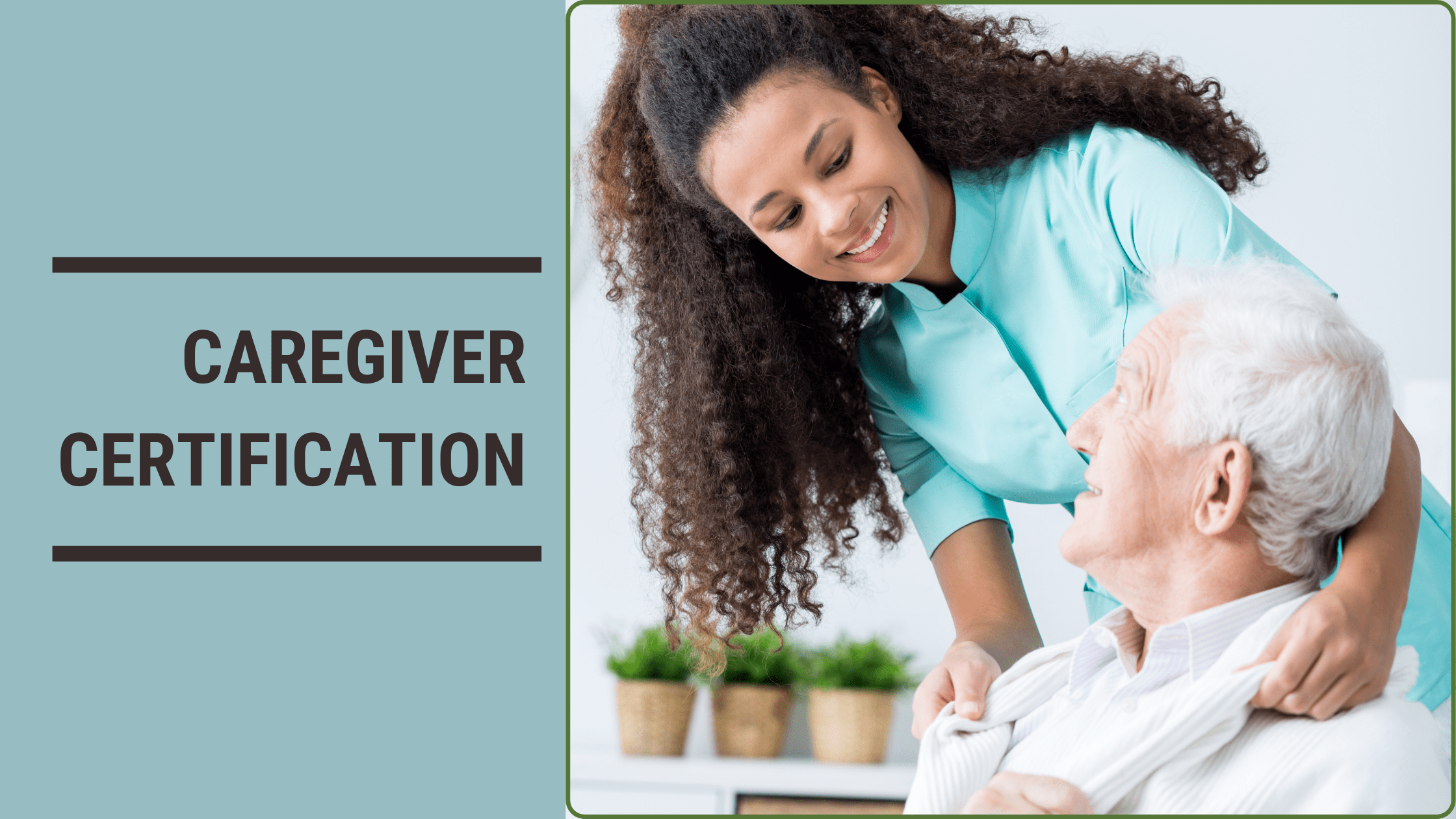
Are you considering becoming a caregiver? Or do you already have several years of experience? In either case, caregiver certification is crucial if you want to deliver a higher degree of care. Keep reading to learn more.
Updated March 1, 2023
Caregiver Certification: A Guide
Further training can pave the way for career opportunities in more specialized fields, like hospice or palliative care, dementia care, and more.
If you’re passionate about a career as a professional, qualified senior care provider, caregiver certification will put you leagues ahead of everyone else.
So if you want to know more about caregiver certification, keep reading. First, we’ll look at the basics, including essential qualifications, common questions, how to get certified, and more.

Caregiving As A Career
Of course, not everyone hears the call to become a caregiver. It takes a special person willing to improve the wellbeing of the person they care for while promoting dignity and independence.
There are several different types of caregivers. Although some perform more generalized care, others are more specialized. But generally, professional caregivers:
- Run errands
- Provide companionship
- Plan and prepare meals
- Enhance seniors’ quality of life
- Provide medication reminders
- Support physical and cognitive conditions
- Help with personal care and other activities of daily living (ADLs)
Of course, this isn’t a comprehensive list. Your responsibilities as a caregiver will vary depending on the elder and their family.
But just as your duties differ, so do qualifications. The elder’s needs, state, and other factors decide your requirements. These also include whether you need to enroll in a specific caregiver certification course. However, the general requirements to become a caregiver involve the ability to:
- Work well in different living situations and locations
- Communicate with seniors kindly, respectfully, and professionally
- Support and care for seniors in their homes with respect and dignity
Additionally, you must be at least 21 years old and have a high school diploma or equivalent.
Why Is Caregiver Certification Important?
Caregiver certification is important because it shows that you have the training and expertise to provide a higher level of care. In addition, it shows that you not only completed training but you passed a certification test demonstrating your knowledge.
In the same vein, certification is a sign of continued education. Under federal law, certified caregivers must participate in continuing education to renew their certification.

Is Caregiver Certification Required?
Becoming a certified caregiver establishes you as an expert in your field. Furthermore, some organizations, like nursing homes or assisted living facilities, only hire certified caregivers.
However, those who assist with ADLs, provide companionship, or help with other essential tasks don’t always need caregiver certification.
Typically, Certified Nursing Assistants (CNAs), Home Health Aides (HHAs), and other professionals that offer medical support need to be licensed.
Additionally, certification is necessary for services that are entitled to Medicare payments. Federal law requires that Medicare-certified caregiving agencies hire certified caregivers for services that are eligible for Medicare.
Certification usually isn’t required for personal care aides or companion caregivers because they provide non-medical services, such as light housekeeping, meal preparation, and companionship.

How To Become A Certified Caregiver
You can find the basic qualifications for becoming a caregiver in your state or region online. Check out national agencies like the Better Business Bureau or local, state, and federal websites. In addition, you can search for lists like In Know’s state requirements list.
Caregiver Certification Step-By-Step
1. Find a caregiver training program approved by your state health department.
Many states offer caregiver resource centers. These can help you find reputable courses, which are often provided at:
- Local universities
- Vocational schools
- The Red Cross
- Local and national caregiver organizations
You can also find caregiver certification courses from national groups such as:
- National Association for Home Care and Hospice
- Family Caregiver Alliance
- National Family Caregivers Association
You can also find caregiver certification courses from national organizations such as:
2. Complete a caregiver training program.
Throughout the course, you will learn about a range of topics, including:
- Home safety
- Medical care
- Housekeeping
- Personal hygiene
Of course, program length varies based on the course and provider.
3. Pass the certification exam.
You will take a final exam to earn your certification at the end of your course. The training organization will present you with your certificate when you pass.

Caregiver Training Requirements Differ By State
Again, caregiver certification varies from state to state. So having a clear understanding of state and federal requirements ensures you have the proper credentials.
Below are the requirements for Massachusetts, Rhode Island, and Connecticut. You can also find course recommendations from the Professional Association of Caregivers.
Massachusetts
- Home Care Licensing: Special Business License
- Non-Medical Traning: 8-hour Certification Course
Rhode Island
- Home Care Licensing: Personal Care
- Non-Medical Training: 8-hour Certification Course
- Additional: 20 hours in the classroom; 5 hours practical
Connecticut
The Connecticut Department of Health doesn’t license home care agencies. Instead, they must register with the Department of Consumer Protection. This agency requires caregivers to pass a background check and basic training.
- Home Care Licensing: Personal Care
- Non-Medical Training: 8-hour Certification Course
- Additional: Must pass a background check
Visit Caregiverlist.com for a complete chart of each state’s caregiving training requirements.

Affordable Caregiver Certification
Caregiver certification courses can differ in cost. Some are low-cost, like online classes. But sometimes, in-person courses and other programs can be expensive (though not always).
Nevertheless, your continued education shouldn’t have a high price. So with this in mind, consider becoming a member of a support group or caregiver alliance. These organizations can help locate affordable training opportunities to advance your career.
The Caregiver Action Network and the Family Caregiver Alliance are where you can find resources and caregiver support groups. You can also use free resources like library books on aging, health, and care.
Regardless of your chosen program, make sure it’s accredited and legitimate. Home care agencies and families should recognize the organization or course. If you’re uncertain, contact a local caregiving agency and ask if they’ve heard of it.
Lastly, read former students’ reviews. These can help you vet the course and its authenticity. Plus, you can learn what to expect based on others’ experiences with the program, so you know what to expect.
MeetCaregivers
Caregiver certification is essential because it shows that you are an expert and improves the care you provide.
Are you looking for a caregiver to assist yourself or a loved one? If so, MeetCaregivers can help. Our qualified in-home care workers can meet all your senior care needs. Call 1 (888) 541-1136 or find a caregiver today.
You can find more resources about caregiving and aging in place in our Blog.
- Care.com. “6 Types Of Senior Care Certifications And Trainings That Will Improve Your Career.” Care.com, Care.com, 11 Aug. 2020, www.care.com/c/stories/5405/senior-care-certifications/.
“Caregiver Training Requirements By State.” - CaregiverList, www.caregiverlist.com/Caregiver-Training-Requirements-By-State.aspx.
Imani, Faizah. “How to Get Certified As a Caregiver.” Work, 9 Nov. 2016, work.chron.com/certified-caregiver-11773.html. - Witt, Scott. “Caregiver Certification & License Questions: How To Hire a Caregiver.” Edited by Jeff Hoyt, SeniorLiving.org, 16 Aug. 2018, www.seniorliving.org/caregiving/credentials/.
